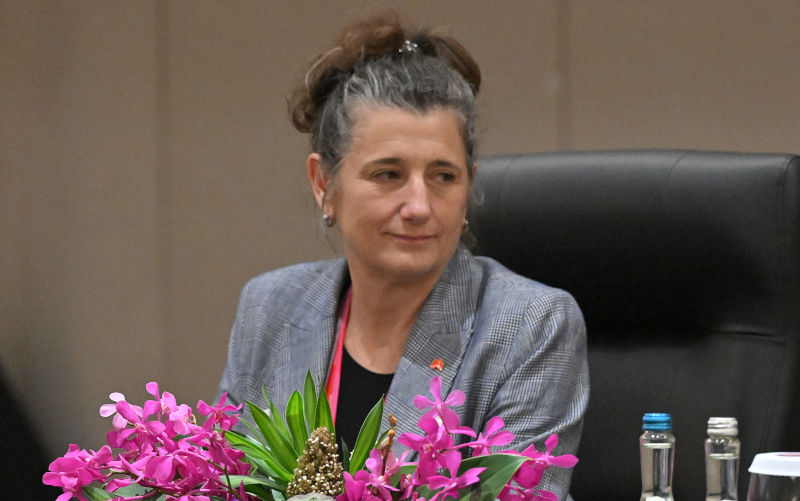New Australian national intelligence chief faces a people challenge
October 26, 2025
At a time in our history when the US tells us that Australia is valued mainly for the sacrifice we are expected to make in joining its strategy against China, our Prime Minister is undermined by intelligence that is incapable of dealing with the bifurcated risk now emerging starkly.
The director-general of the Office of National Intelligence heads a critical link in Australia’s security apparatus. Recently the incumbent of five years, Andrew Shearer, was removed by the Albanese Government. We know that he was sacked because the government announced also that it was pleased Shearer accepted its offer of Australia’s diplomatic envoy to Japan. Instead, the government put Kathy Klugman into the position. Questions abound. Foremost, what does it mean for Australia’s security?
The Opposition has been critical, saying it is damaging for a prime minister to intervene in the filling of such a position, which should be above politics. Which is a bit rich as Shearer was appointed at the behest of prime minister Scott Morrison in 2020. Morrison was even more unconventional, as Shearer had been working for the influential US think-tank Centre for Strategic and International Studies in Washington for two years since 2016. The purpose of CSIS is to “define the future of US national security”. Which it achieves through the American hasbara globally, creating “robust networks” penetrating institutions selectively, to “inform key policymakers and influencers”.
Shearer was senior adviser on Asia-Pacific security with CSIS in Washington. As such he was part of the US fixation on dominating China via military and economic strategies, reflected in extraordinary sustained defence spending since 2010. Thereby Shearer brought to ANI a professional involvement in the overt US security goal of dominating China militarily, using allies as building blocks. If one was in any doubt that Shearer’s view of the world is restricted, his recent address to the Senate and later in Perth to a business audience would have done nothing to engender confidence that our intelligence is based on properly broad perspectives. While identifying China’s military build-up, nowhere does Shearer concede that unambiguous US and allied military pressure on China exists, much less as a risk factor for Australia. Such is beyond the mindset on display in his speech.
At a time in our history when the US tells us that Australia is valued mainly for the sacrifice we are expected to make in joining its strategy against China, our prime minister is undermined by intelligence that is incapable of dealing with the bifurcated risk now emerging starkly. Our intelligence has to cover China but equally the United States. And fused. Each is complex, different while connected. It would be disappointing if the Prime Minister did not have this conundrum in mind as he appointed Klugman to take charge of Office of National Intelligence.
Klugman appears to have a serious pedigree in policy development and delivery for Australia, as deputy secretary in Foreign Affairs and divisional head in both Foreign and Prime Minister and Cabinet. That solid underpinning fitted her for a role at the political interface on the prime minister’s staff. She will need everything she has demonstrated to create the ONI which Australia needs. Would it surprise that she has been bequeathed a rat’s nest of US acolytes, incapable of adjusting? But personnel aside for a moment, conceptual issues just spring out.
Take the Five Eyes intelligence sharing arrangement between US, Britain, Canada, Australia and New Zealand. It’s no longer the jolly pallid lot that its founders envisioned should reign forever, happily in each other’s pockets. Ask Canada for a start.
Five Eyes is terminally flawed now, as competing strategic interests intensify. Obviously, Australia cannot rely on US material when our interests diverge. Shouldn’t it be a goal that Australia is not dependent on any other nation for its critical intelligence? What will it take for us to become self-reliant in intelligence? It’s clearly not going to be cheap or quick. But it would transport our workforce into intellectual and technological areas which are far more valuable nationally than the Meccano exercise of creating nuclear submarines from US and UK components at a cost of six times the entire annual defence budget. Perhaps. Please.
But back to Klugman’s people challenge – forging an intelligence workforce which knows Australia’s interests. And comprehends them as unique and paramount ie US interests are just one factor to be addressed alongside many, including China’s or anybody else’s. That has to be the base, upon which other factors such as security understandings play out.
It’s foolish to assume that a feedstock of such talent can be found from our major universities. Sydney University graduates can be influenced by the United States Study Centre, and its overt agenda which proffers US perspectives to students, graduates and interested public. The head of ANU’s “National Security College”, Rory Medcalf, is a fellow of the CSIS, the same Washington body whose purpose is to target key policymakers and influencers in Australia for US ends. And let’s not forget the variety of “think-tanks”, hoary old professors and security commentariat who show real talent in detecting which way the wind is blowing.
We wish Kathy Klugman luck – she’ll need it in spades.
The views expressed in this article may or may not reflect those of Pearls and Irritations.


